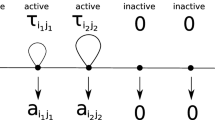Abstract
We revisit some concepts of superiority and weak stability of population states in evolutionary games with continuous strategy space. We prove a general stability result for replicator trajectories by introducing the concept of superiority with respect to a given closed set. Some important results in the literature regarding weak stability turn out to be special cases of our main result.
Similar content being viewed by others
References
Alós-Ferrer, C. (2006). The discretization of continuum strategy spaces. International Game Theory Review, 8, 499–514. https://doi.org/10.1142/S0219198906001053.
Apaloo, J. (1997). Revisiting strategic models of evolution: The concept of neighbourhood invader strategies. Theoretical Population Biology, 52, 71–77.
Billingsley, P. (1999). Convergence of probability measures, 2nd edn. In Wiley series in probability and statistics: Probability and statistics. New York: Wiley. https://doi.org/10.1002/9780470316962.
Bomze, I. M., & Pötscher, B. M. (1989). Game theoretical foundations of evolutionary stability, volume 324. In Lecture notes in economics and mathematical systems. Berlin: Springer.
Bomze, I. M. (1990). Dynamical aspects of evolutionary stability. Monatshefte für Mathematik, 110(3–4), 189–206. https://doi.org/10.1007/BF01301675.
Cressman, R. (2003). Evolutionary dynamics and extensive form games. In MIT Press series on economic learning and social evolution (Vol. 5). Cambridge, MA: MIT Press.
Cressman, R. (2005). Stability of the replicator equation with continuous strategy space. Mathematical Social Sciences, 50(2), 127–147. https://doi.org/10.1016/j.mathsocsci.2005.03.001.
Cressman, R., & Hofbauer, J. (2005). Measure dynamics on a one-dimensional continuous trait space: Theoretical foundations for adaptive dynamics. Theroretical Population Biology, 67, 47–59. https://doi.org/10.1016/j.tpb.2004.08.001.
Cressman, R., Hofbauer, J., & Riedel, F. (2006). Stability of the replicator equation for a single species with a multi-dimensional continuous trait space. Journal of Theoretical Biology, 239, 273–288. https://doi.org/10.1016/j.jtbi.2005.07.022.
Eshel, I., & Motro, U. (1981). Kin selection and strong evolutionary stability of mutual help. Theoretical Population Biology, 19, 420–433.
Eshel, I., & Sansone, E. (2003). Evolutionary and dynamic stability in continuous population games. Journal of Mathematical Biology, 46, 445–459.
Hingu, D., Mallikarjuna Rao, K. S., & Shaiju, A. J. (2016). Evolutionary stability of polymorphic population states in continuous games. Dynamic Games and Applications, 8, 141–156. https://doi.org/10.1007/s13235-016-0207-1.
Hingu, D., Mallikarjuna Rao, K. S., & Shaiju, A. J. (2016). Evolutionary stability of dimorphic population states. Annals of the International Society of Dynamic Games, 14, 249–266.
Hofbauer, J., & Sigmund, K. (1988). The theory of evolution and dynamical systems. In London mathematical society student texts, vol. 7. Cambridge: Cambridge University Press (Mathematical aspects of selection, Translated from the German).
Maynard Smith, J. (1974). The theory of games and the evolution of animal conflicts. Journal of Theoretical Biology, 47(1), 209–221. https://doi.org/10.1016/0022-5193(74)90110-6.
Maynard Smith, J. (1982). Evolution and the Theory of Games. Cambridge: Cambridge University Press.
Oechssler, J., & Riedel, F. (2001). Evolutionary dynamics on infinite strategy spaces. Economic Theory, 17(1), 141–162. https://doi.org/10.1007/PL00004092.
Oechssler, J., & Riedel, F. (2002). On the dynamic foundation of evolutionary stability in continuous models. Journal of Economic Theory, 107(2), 223–252. https://doi.org/10.1006/jeth.2001.2950.
Sandholm, W. H. (2010). Population games and evolutionary dynamics. In Economic learning and social evolution. Cambridge, MA: MIT Press.
Shaiju, A. J., & Bernhard, P. (2009). Evolutionarily robust strategies: Two nontrivial examples and a theorem. In it Advances in dynamic games and their applications, annals of the international society of dynamic games (pp. 1–19). https://doi.org/10.1007/978-0-8176-4834-3_19.
van Veelen, M., & Spreij, P. (2009). Evolution in games with a continuous action space. Economic Theory, 39(3), 355–376. https://doi.org/10.1007/s00199-008-0338-8.
Vickers, G., & Cannings, C. (1987). On the definition of an evolutionarily stable strategy. Journal of Theoretical Biology, 129(3), 349–353. https://doi.org/10.1016/S0022-5193(87)80007-3.
Weibull, J. W. (1995). Evolutionary game theory. Cambridge, MA: MIT Press.
Acknowledgements
We would like to thank two anonymous reviewers for carefully reading the manuscript and providing their valuable comments and suggestions to improve it.
Author information
Authors and Affiliations
Corresponding author
Rights and permissions
About this article
Cite this article
Hingu, D., Mallikarjuna Rao, K.S. & Shaiju, A.J. On superiority and weak stability of population states in evolutionary games. Ann Oper Res 287, 751–760 (2020). https://doi.org/10.1007/s10479-018-2971-3
Published:
Issue Date:
DOI: https://doi.org/10.1007/s10479-018-2971-3




